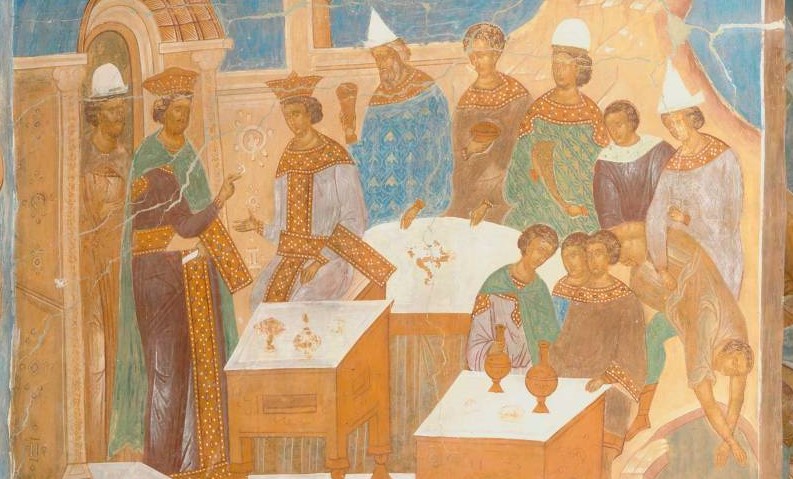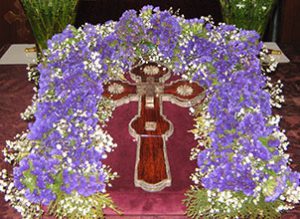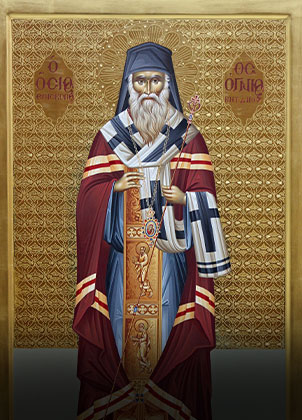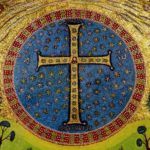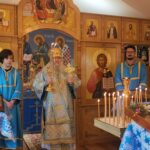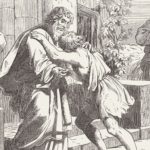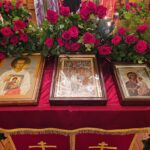In the name of the Father and of the Son and of the Holy Spirit.
Today’s Gospel parable may be regarded as a continuation of the one which was read last Sunday, the parable of the vineyard. In that parable the master of the vineyard sent his son to rebellious vinedressers, but they led him outside of the vineyard and killed him. In this way, the Lord foretold His death on the cross outside of Jerusalem.
In the parable read today, which the Lord said right after the parable of the vineyard, the king prepared a wedding feast for his son. So, the son of the vineyard’s master, who had been killed, appeared now as a bridegroom at a wedding feast. This denotes Christ’s resurrection.
The king sent out his servants to call those who were invited to the wedding; and they were not willing to come.
Those who were invited are the Jews; they were the chosen nation which was given promises from God. From the time of their forefathers they awaited the promised Messiah.
Is it possible to imagine someone who would refuse to come to a king’s wedding feast, especially with personal invitation? Of course, not; because even if one would not be attracted by the enjoyment of the feast or by the honour of being invited, he would be scared to offend the king in refusing. Nevertheless, in this parable, among all those invited, every single man refused to come, citing different pretexts. And the king’s feast was neglected. Thus the Gospel indicates the absurdity, foolishness and insolence of their behaviour.
However, their insolence didn’t stop at this. They even insulted the king’s servants sent to them, and killed them. Then the king’s longsuffering gave way to wrath. “He sent out his armies, destroyed those murderers, and burned … their city” (Math. 22)
The Lord speaks of the events which took place 37 years thereafter. Everything happened exactly as it was indicated by these two parables:
The Son of God, Jesus Christ was rejected by His people and crucified, but even then, God continued his mercies on them. After the resurrection, Christ sent His Apostles to the Jewish people, inviting them to His Church, as to a wedding feast. And only when all the apostles were killed (except St John), God’s wrath fell upon those who didn’t make any use of his longsuffering.
In the year 70 the Jewish uprising against Romans was defeated. The legions of Titus took Jerusalem after a siege; they burnt the temple and destroyed the city. Hundreds of thousands were killed during the siege.
Those invited refused to come, but the wedding feast was ready. The King’s chamber should be filled. “Then the king said to his servants, ‘The wedding is ready, but those who were invited were not worthy. Therefore go into the highways, and as many as you find, invite to the wedding.’ So those servants went out into the highways and gathered together all whom they found, both bad and good. And the wedding hall was filled with guests”.
Who are these new guests, who were not invited from the beginning, but took the place of those invited? – The Gentiles, pagan nations. Unlike the Jews they didn’t know God, and were distant from His kingdom. When the Jews, having been invited, refused to come, then the Gentiles filled the wedding hall, the Church.
Similarly St Paul speaks to the Jews in Antioch: “It was necessary that the word of God should be spoken first to you. But since you reject it…, we will leave you and go to the Gentiles.” (Acts 13)
Of those invited, instead of attending the king’s supper, they went their separate ways, one to his own farm, another to his business.
As in this parable, similarly happens in our life: our worldly occupations and enjoyments, our attachment to this temporal life lead us away from God.
We forget that the festival of this life will pass quickly; that we are strangers and sojourners in this life, and our homeland is in the Heavens.
The Lord invites us not to anything hard, unpleasant or dangerous. He invites us to His wedding feast. In the Revelation of St John there is a different image, but having a similar meaning: The Lord says: “Behold, I stand at the door and knock. If anyone hears My voice and opens the door, I will come in to him and dine with him, and he with Me” (Rev. 3). The Lord invites all to His Kingdom. He Himself deigned to come on earth and take our sins upon Himself, so as to make us partakers of the endless joy and glory.
The Lord concluded His parable, saying: “For many are called, but few are chosen.” The Lord calls everyone, and He knocks at the door of every heart, but only a few hear His calling and open to receive Him, only a few come to His feast.
“Few are chosen”. Who are these chosen? – Those who willingly choose the King’s wedding chamber, and not the feast of the worldly life. It solely depends upon us to hear the voice of the Lord and to become participants of His supper.
Amen.

